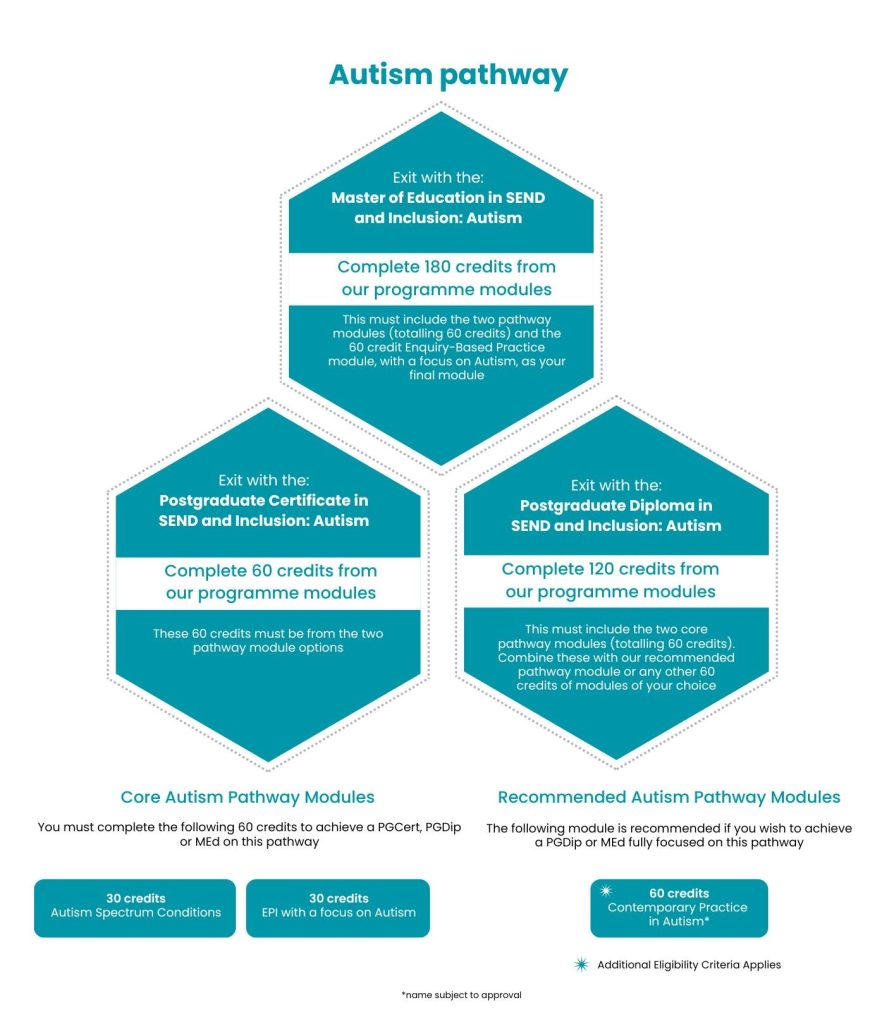

PGDip in SEND & Inclusion: Autism
MEd SEND & Inclusion: Autism
 Make a booking now
Campus Online Login
Make a booking now
Campus Online Login



Real Training’s Masters in Autism is your route to gaining specialist knowledge and skills to support autistic students of all ages.
This online programme has both a theoretical and a practical focus which will allow you to make a real impact. You will learn more about the latest research and models of autistic spectrum conditions as well as how to create best-practice guidance for supporting autistic children in your setting.
You can study a Postgraduate Certificate (60 credits), a Postgraduate Diploma (120 credits), or a Master of Education in SEND and Inclusion: Autism (180 credits). If you opt for the full Masters qualification, you will be undertaking your own research project under the guidance of our autism experts, as well as working one-to-one with a chosen autistic student. You will be creating a personal learning profile that can help your learner throughout their school journey.
There is the possibility to bring in credits achieved through previous studies as Recognition of Prior Learning. Please see this page for further information.
This programme was developed and is delivered and assessed by Real Training, awarded and quality assured by Middlesex University. You will receive a Middlesex award on successful completion.

Katie is the strategic lead for our five MEd Programmes. She has worked within educational settings for a decade as a teacher, a SENCO and a member of the Senior Management Team. She has a Masters Degree in Educational Research Practice from the University of Cambridge.
During her time spent as a SENCO and Deputy Designated Safeguarding Lead, Katie put in place strategies to support pupils in the school with EAL and led a specialist unit for pupils with complex needs, including physical disabilities.

Sue is a senior educational psychologist with 30 years’ experience in autism. She has been a consultant to the Lorna Wing Centre for Autism (part of the National Autistic Society) since 1996 and was a close colleague of the late autism research pioneer, Dr. Wing.
As specialist ASD advisor/EP for numerous London boroughs, Sue has been instrumental in setting up provision for children with ASD across early years, primary and secondary.
Benefit from access to practicing educational psychologists who will equip you with the knowledge and skills to make a difference in your unique setting.
Our postgraduate programmes are developed, delivered and assessed by Real Training, awarded and quality assured by Middlesex University – London’s University of the Year 2025 (Whatuni Student Choice Awards 2025).
Studying this masters in autism will enable you to:
Add real value to your educational setting:
Develop real competence:
Enhance professional expertise:
Learn on the job:
Engage with flexible e-learning:
Study modules in your own time and pace:
Connect with your peers
We will ensure that you never feel lonely or unsupported in your studies.
Liaise with experienced tutors
This programme is suitable for a wide range of roles, however we would recommend this option to those working as a SENCO, a Specialist Teacher, a class/subject teacher or a Teaching Assistant with a degree looking to understand more about – and potentially specialise in – Autism.
Choose from our core, recommended and optional modules to achieve the required number of credits for your chosen qualification.
The Masters in Autism comprises core modules and recommended modules which focus on topics relating to working with students with autism. There is flexibility in the programme for you to choose modules from another area of interest, in place of the recommended modules, if you wish.
For all exit awards, you will need to complete the following two core modules:
For the PGDip and MEd, you will need to achieve 120 credits. 60 of these credits will come from the two core modules listed above. For the other 60 credits, we recommend Contemporary Practice in Autism (60 credits). You can however also choose from the optional modules listed below.
To complete the full MEd, the Enquiry-Based Practice (60 credits) needs to be your final module and your chosen research project for this module must have an autism focus.

Optional modules, which can be chosen instead of one or more recommended modules.
You will need to produce:
Where indicated by your tutor, you may submit multimedia resources that you have produced within your applied practice as part of your final portfolio of evidence.
Please note: Some of our modules have specific eligibility requirements. Please check the course pages for more information.
Are you based in an international setting?
This programme is available online and can therefore be completed anywhere in the world. The programme content is designed and written with both UK and international settings in mind.
Please click here for advice on payment options and other information relevant to those studying outside of the UK.
Cohorts begin in January, May or September.
The next cohort begins on 15 September 2024. Book and enrol before 15 September 2024 to join our next cohort.
As it takes time to process your application and payment, we strongly recommend that you register as soon as possible, so that you don’t miss the next intake.
Please note, this programme is currently subject to approval.
We offer a flexible range of fees to suit your finances. Please refer to the module pages to see the cost of each individual module.
The cost of a PGCert with Real Training (made up of 60 credits) varies, typically you could expect it to cost approximately £3,130 + VAT.
The cost of a PGDip with Real Training (made up of 120 credits) varies. Typically, two 30 credit modules and one 60 credit module, such as the National Award for SEN Coordination, will cost approximately £5,625 + VAT.
The cost of a Master of Education in Autism (MEd SEND and Inclusion: Autism) with Real Training (made up of 180 credits) varies. Typically, two 30 credit modules, and two 60 credit modules – including the obligatory Enquiry-Based Practice module – will cost £8,320 + VAT.
To find out the exact cost of your chosen pathway, visit the module pages linked above.
Speak to us on +44 (0)1273 358080 or make a booking.
It depends. Most delegates tend to complete the programme within 3-5 years. It usually takes a year to complete a module, however some delegates will choose to study 2 modules at a time. It also depends if a delegate has existing credits that they can bring into the programme.
Delegates may be able to bring in credits they have achieved with another provider. If you think this could apply to you, find out more about Recognition of Prior Learning.
You are able to take breaks between the modules if need be, however, as long as you return to complete the programme within 5 years, your credits will remain valid.
We offer a number of Masters programmes, enabling you to develop specialist skills in SEND, pastoral care or leadership:
Online – self paced
Study at your own pace and time
Cohorts begin in January, May and September.
The next cohort begins on 15 May 2026. Book and register before 15 May 2026 to join our next cohort.